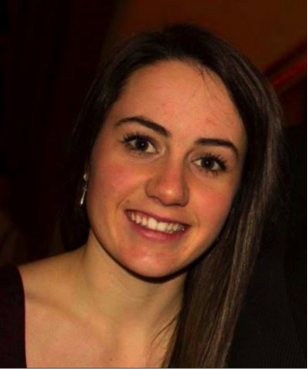AUTHOR: Crystal Mahadeo

Shawna Thompson is a PhD student in Dr. Jane Foster’s lab. Recently, Shawna transferred from Masters to PhD to continue her research. She also attended SfN in Chicago for the first time! We talked about the transfer process and her experience at the Neuroscience conference.
1) Tell us about your research.
I am working with Dr. Jane Foster to investigate peripheral immune influences on the central nervous system at the cellular and behavioural levels. My first project involves studying microglia in T cell deficient mice.
2) Why did you want to get into research?
I’ve always been interested in the fields of science that still have big unanswered questions. Research gives me the opportunity to be inquisitive, while working behind the scenes to make discoveries that will impact the future of healthcare in a big way. In undergrad I loved studying microbial pathogenesis and virology, and reading neuroscience articles. When I started reading about the gut-brain axis, it seemed to be the ideal intersection between my interests and I was hooked.
3) Why did you decide to transfer to PhD? Is this something you’ve always wanted to do?
It still feels like I’m at the very beginning of a research story; one year is not a lot of time! I felt I needed more time to develop my research interests, so I was thrilled when the opportunity to transfer to PhD arose. I also have so much more to learn from Dr. Foster, she is an excellent mentor. I had not ever really considered transferring in advance, in part because I didn't know that it would be a possibility for me. While I have loved science for as long as I can remember, I always tend to make my academic and career decisions based on what is the most interesting opportunity available at any given time, so my plan is always in flux.
4) What are you future career plans?
Right now I love research and hope to become a PI in the future, although if the past is any indication of the way my career path changes, I really have no idea where I will be 10 years from now. I wanted to be a chef for the longest time!
5) What part of the transfer process did you find most difficult?
There was a lot of writing involved with my transfer, although it seems everyone’s experience is a bit different. While it seemed like a lot of work at the time, now I am glad that I was able to dedicate more time during that period to reading and literature review. (Editor's note: outlined in the student handbook,* the transfer from MSc to PhD requires the writing of a report for the committee in the format of a Journal of Neuroscience. The content of the report must cover the work done to date in the MSc as well as information on what the research that the student plans to do in the PhD. program. The student also prepares a 15-20 minute presentation on the work done to date and the work that is to be done for the PhD.)
6) Any tips of advice for those considering a transfer to PhD from Masters?
With regards to making the decision to transfer, talk to as many different people at different levels as you can, and reach out to mentors from your past. During the process, don’t shy away from the writing process, it turned out to be very helpful. For my transfer I had to write a research proposal outlining my plans for the first two chapters of my thesis, and a draft of a paper from the research I had already completed.
7) You recently went to the Society for Neuroscience (SfN) meeting. How was that experience?
It was really neat to meet some of the scientists who wrote the papers I study, and I saw my first couple of Nobel Prize winners! The social and collaborative aspects of science really shine at SfN, and the amount of relevant posters and talks was incredible. It was a wonderful experience to hear May-Britt Moser's presidential lecture, and Beth Stevens gave a very interesting talk about microglia. Overall, it was both inspiring and exhausting, I can’t wait for my next SfN meeting!
8) What do you like to do when you aren’t working in the lab or attending conferences?
As the Director of Member Relations for SOMA, I have been organizing a MiNDS dodgeball team, The Lobotomizers! We’re looking for new members, even if you can only show up for a game or two, so come out if you’re interested! I'm also on the Board of Directors at the Rockton Agricultural Society, a non-governmental organization that my family has been involved in for generations and I’ve recently begun writing lay summaries of journal articles for an ASD Mental Health blog. I also love baking, playing team sports and in the summer I try to spend as much time stand-up paddleboarding on Lake Huron as possible.
If you would like to join the MiNDS dodgeball team, please contact Shawna at: thompsl3@mcmaster.ca
*You can find the MiNDS handbook online: http://neurosciencemcmaster.ca/files/MiNDS%20Student%20Handbook%202015-2016.pdf